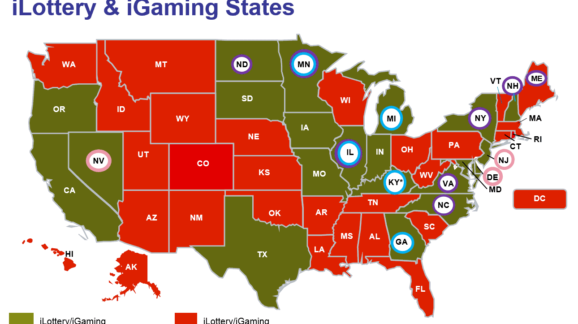Chaffetz Tells States and Lotteries: If You Don’t Want an Online Gambling Ban, Introduce Your Own

According to a Gambling Compliance story (paywall) posted today, Rep. Jason Chaffetz (R-Utah) participated in a conference call last week with about 20 state and lottery officials to discuss his proposal to create a nationwide ban on Internet gambling. Chaffetz’s bill rewrites the 1961 Wire Act, which he claims was “reinterpreted” by Obama’s DOJ in 2011—which opened the door for states to legalize online gambling. When the participants voiced their concerns that Chaffetz’s bill would also criminalize lottery activities that were legal prior to 2011, Chaffetz responded by brazenly suggesting that when his bill passes, they can try to pass their own federal bill. “You can come back and re-start if you want,” Chaffetz concluded.
The call was organized by the Commerce Committee of the National Governors Association (NGA), which has voiced opposition to Chaffetz’s bill in the past. But some on the call noted surprise at his aggressiveness. Mark Hichar, a gaming attorney on the call, found Chaffetz’s statement “surprisingly aggressive.” According to Hichar, the bill would eliminate currently legal lottery offerings, such as online lotter ticket sales and subscriptions (currently available in 8 states), online real-time games like pull-tabs (legal in five states when Kentucky launches this year), and of course, online casino-style games legal in New Jersey, Nevada, and Delaware for almost two years now.
“It seemed very odd that you would expect a state to file federal legislation to enable it to be able to conduct gaming in its borders,” Hichar said. Indeed, it would be strange, unless they happened to have a billionaire who could get his lobbyists to write the bill and push it through the legislative process.
Also strange is that Chaffetz’s, while worried about the inability for states to keep online poker or lottery sales in-state, doesn’t have a problem with many other kinds of Internet betting. As gambling industry writer Chris Grove noted in his recent article, Chaffetz’s bill exempts many kinds of online gambling from the ban:
RAWA carves out any activity exempt from the definition of “bet or wager” enshrined in the UIGEA. The most visible member of this group: online fantasy sports betting, including daily fantasy sports, where American consumers in 45 states ponied up around one billion dollars in entries during 2014…
RAWA excludes online horse betting, which sees hundreds of millions wagered each year, and whatever “charitable” gambling (itself a multi-billion dollar, often for-profit industry) states permit to operate online in advance of the Act.
Finally, since the Wire Act can only apply to interstate transmissions, any closed-circuit online gambling offerings – such as the mobile casino and sports betting products offered to guests at Adelson’s Venetian in Las Vegas – would not be impacted by RAWA.
The casinos in New Jersey, however, will be hurting if RAWA passes, losing between $10 and $45 million a year from their online revenue. Of course, the states with any kind of online gambling that RAWA would ban will also suffer from lost revenue. But Chaffetz doesn’t seem at all concerned about that. After all, if we don’t like we can just introduce a federal bill and change it, right?